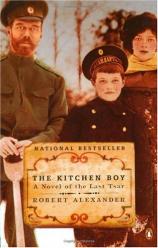Reading Group Guide
Discussion Questions
The Kitchen Boy: A Novel of the Last Tsar

1. How did you respond to Misha as a character? How did your feelings toward him change as you read the novel? Do you feel sympathy for him? Why or why not?
2. Misha's tape-recorded recollections are complicated by the passage of time. He observed events through the naïve eyes of a teenager, but he retells them from the perspective of a jaded elderly man. How does the distance between seeing and speaking affect his narration?
3. Misha is a man of harsh judgments —of his country, of Communism, and ultimately of himself. Do you agree with his judgments?
4. Early in the novel, Misha says that truth is one of the three values that enable America to save itself. Recognizing the saving power of truth as he does, why is Misha incapable of telling a true story? Would telling the truth make his salvation possible?
5. The Kitchen Boy describes both Nikolai and Aleksandra as being "blinded by religion," and it tells of one of the key episodes in the rise of an officially atheistic state. Nevertheless, can it be argued that The Kitchen Boy is, at heart, a religious novel?
6. In The Kitchen Boy, the Romanovs bear their sufferings with almost saintly forbearance. Does their acceptance of suffering make them nobler in your eyes, or does it merely deepen their status as pathetic victims of history? People sometimes talk about the redemptive power of suffering. Does suffering redeem anyone in this novel?
7. The Kitchen Boy offers a great deal of commentary on what Misha calls "the Russian soul." Did this novel help you toward a different understanding of what it means to be Russian? Nations are made up of millions of individuals, and yet those individuals do share an invisible connection. Is it possible to speak coherently about a national soul?
8. In Misha's view, "a great curse was unleashed" on the night of July 16-17, 1918, "inundating every corner of [his] vast homeland." In what sense can the subsequent path of Russian history be understood as being the product of a "curse"? Do other nations, America included, suffer beneath their own national curses?
9. Imagine The Kitchen Boy as the basis for a screenplay. Choose a scene and discuss how you, as the director, would want to film it.
10. Late in the novel, Misha reflects that forgiveness is "the last thing" he desires; he does not want it at all. Why is he unable to accept mercy?
11. What is your response to the ending of the novel? The "true" story of May and Misha may strike some readers as beautiful. Others may find it wildly improbable or even grotesque. Does their love strike you as a miracle, as an impossibility, or as something else?
12. The Kitchen Boy retells one of the most frequently told stories in twentieth-century history. Nevertheless, the novel succeeds in maintaining suspense. How does Robert Alexander accomplish this feat of storytelling?
The Kitchen Boy: A Novel of the Last Tsar
- Publication Date: January 27, 2004
- Genres: Fiction, Historical Fiction
- Paperback: 229 pages
- Publisher: Penguin (Non-Classics)
- ISBN-10: 0142003816
- ISBN-13: 9780142003817








